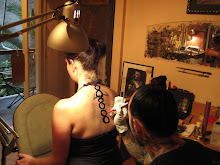As we crank up the volume on our television sets this Olympics to catch the heart-racing live commentary of our favourite sports, the Deaf community will hear every ounce of excitement through captions.
Charlie is the ears of the Deaf and Hearing Impaired community. She started as an online/live speech captioner before she was promoted to her current job as solutions manager. AI-MEDIA provides captions for 27 channels across the FOXTEL network.

How did you get into captioning?
I used to work in a publishing company before I started captioning. My mother is also a captioner and a subtitler (Greek to English), and she introduced me to the captioning business.
What training and qualifications do you have and are they necessary to get the job?
There aren't any specific qualifications needed to get a job in captioning, although a university degree would definitely come in handy. I graduated from the University of Sydney with a Bachelor of Arts. I majored in Linguistics, Modern Greek and Performance Studies, but I didn't have any captioning qualifications. I had to sit for several tests (grammar, general knowledge and transcription) before I was given the job.
There is usually onsite training for new captioners. Live speech captioning is another field, and it requires fairly intensive training, which is provided by most captioning companies.
What skills are needed?
Good English skills are necessary – both spelling and grammar. Captioning companies will usually ask you to sit a test in your interview to gauge your English skills.
Is there a demand for television captioners?
At the moment, The Broadcasting Services Regulations require free-to-air channels to caption all prime time, news and current affairs programs. The Human Rights and Equal Opportunity Commission also requires free-to-air channels to increase the volume of captioned programming progressively over a period of years with a goal to have 100 per cent captioned programming in the future. Due to the growing volume of captioned material, I believe the demand for captioners will continue to grow.
Besides television, what other industries need captioners?
We have provided live captioning for conferences in the past, and with the technology boom, the sky’s the limit. I would love to see captioning become commonplace on the Internet. There is a lot of worthy content being generated that Deaf and Hearing Impaired people don’t have access to.
Do you always work on the same programs?
We provide captions for 27 channels across FOXTEL, including Fox 8, Lifestyle & Food, Arena, and Crime & Investigation. So, there’s always a variety of programs to work on. It’s never a dull day in the office!
What projects are the most challenging and which are you most proud of?
The most challenging projects are always the live ones. As a speech captioner, there is a lot of preparation involved – for example vocab lists and dictionaries. It’s quite nerve-racking knowing that everything you’re saying will be on show for all the viewers, so there’s little or no room for error in that situation. When I pull off one of the live programs without a hitch, I’m always very proud.

Describe what a captioner might do in a typical day?
As an online captioner, when I was onsite at the TV stations, I would begin by creating caption files from the news room system, which provides journalists’ with new story scripts and content from the autocue. I also updated my dictionaries with any relevant vocab, in case we needed to ‘go live’ with any breaking stories. By on-air time, we must have our captions ready with the corresponding audio.
As an offline captioner, you’re more likely to receive programs that will be aired in the future, so you have more time to work on them. This involves transcribing the audio and ‘breaking’ the text into a readable and grammatically correct caption format, before timing the captions so they appear as the audio is being heard.
What do you most like about the job?
I love everything about captioning! I’ve always been a bit of a stickler for English use and grammar, and captioning suits me perfectly. I also love the idea that my work brings access to those who didn’t previously have it and really helps to include more people in our society.
What do you like least?
Probably the stress of preparing for live events.
Do you have flexible working hours?
Yes, my hours are very flexible, especially at my current job. One of the great things about being a captioner is that you complete your work and then you’re able to leave it behind. It doesn’t impinge upon your social life or your life outside of work hours.
What is your working environment like?
My working environment is very comfortable. It has to be, as a captioner spends a lot of time in front of their computer. Offline captioners often have the option of working from home, which is a big plus. I try to do some home-based work two to three times a week, if possible.
What are the reactions of the Deaf and Hearing Impaired to your work?
The Deaf and Hearing Impaired community are grateful for the fact that they’re getting access to this content that we, as hearing people, have taken for granted for many years. Obviously, and rightly so, the Deaf community are campaigning for more captioned programs to be on air. They expect high-quality captions in respect to spelling and grammar and also that the captions reflect the soundtrack of the program. As a captioner, I have maintained a high standard of quality and will continue to provide exactly what they deserve.



